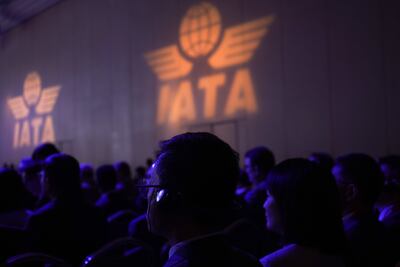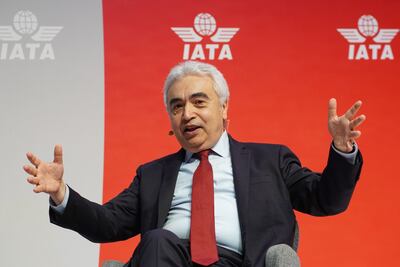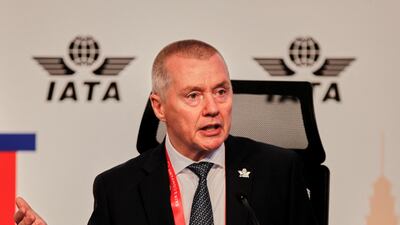Global airlines struck an optimistic tone about the future of the industry, which is expected to collectively earn about $10 billion in net profit this year, but voiced their concerns about an array of challenges, including the road map to meeting climate targets.
The industry is benefitting from a strong recovery in travel demand that has lifted air fares and pushed airlines to order new fuel-efficient jets to expand their operations following the Covid-19 pandemic.
That was reflected in a more buoyant mood during the annual general meeting of the International Air Transport Association (Iata) in Istanbul this week, which had about 300 airlines in attendance.
"You can see the mood of the industry has been more positive," said Iata director general Willie Walsh on Tuesday. "We sit here at the end of this event optimistic about the future."

Yvonne Makolo, chief executive of RwandAir and the newly appointed chairwoman of the Iata board of governors, said the key takeaway was the optimism for the industry.
"We are seeing a strong recovery but are also cognisant of the challenges that we're facing ... in terms of the issue of sustainability and the pressure on airlines," she said.
Airlines raised concerns about the difficult road they face as they try to achieve their goal of reaching net-zero emissions by 2050, particularly in the absence of a sufficient supply of sustainable aviation fuel, which currently accounts for only 0.1 per cent of airline consumption.
Carriers are relying on sustainable aviation fuels to help them achieve 62 per cent of their emissions reduction target. However, the fuel is currently two to four times more expensive than kerosene.
Airlines also called for wider co-operation among stakeholders to support efforts to achieve the climate target and pledged to work on a road map of interim goals in the coming year.
"We are totally committed to achieving our net-zero targets in 2050 ... we call on everybody else to support us in doing it ... everybody is going to have to play their part," Mr Walsh said as he listed governments, plane makers, regulators and airports.
"They're going to have to raise the bar to work with us to ensure that we can achieve what is an absolute critical goal."
Ms Makolo echoed the call for collective action.
"The aviation industry has set very, very optimistic and challenging targets and we're determined to do as much as possible to achieve those targets." she said.
"But it's not only for the airlines to take on; it's the political system that needs to work together for us to meet those targets."
Asked about the goals that Iata will set to move the needle on its interim sustainability goals before its next gathering next June, Mr Walsh said that association would be speaking to its airline membership around the world on the issue as various regions have different challenges.
"Different parts of the world are moving at different paces and for us, representing global airlines, we've got to factor all of that into account," he said.
"We don't want to leave anybody behind. We want to make sure everybody is comfortable with the conversation as we move forward because it is critical that we bring everybody together.
"It is a global problem that requires a global solution and we've got to make sure that everybody has the opportunity to participate in that."

Tim Clark, president of Emirates airline, which will host the next Iata meeting in Dubai, said: "We need to do something more than moan and groan, and say, 'it's not fair ... we can only do what we are doing'."
"Money is probably the biggest single lock-up because they are hugely expensive programmes to transition the global economy and decarbonise it."
Last month, Emirates announced a $200 million fund for research and development projects focused on advanced fuel technology that can reduce commercial aviation's environmental impact.
Mr Walsh said airlines had acknowledged and accepted the scale of the problem and were having a "very healthy and very important" debate about how to achieve the 2050 target.
"It's about the reality. We're not, as airlines, going to do this alone. It is not good enough for everybody else to join us and say yes, we agree," he said.
"They need to join us and say yes, we agree and here's what we're going to do."
Fatih Birol, executive director of the International Energy Agency, said during an Iata panel discussion that the airline industry faced the risk of a "reputation problem" if it did not address the public's perception of its contribution to global emissions.
The airline industry will be "one of the last" to find lasting solutions to carbon emissions because it is a hard-to-abate sector, he said.
Airlines must make clear to the public that while the sector's contribution to global emissions is "tiny" at 2 per cent, it is taking this seriously with concrete efforts, he said.

Airlines also voiced their frustrations with aircraft delivery delays that have disrupted their schedules and supply chain drawbacks that left them unable to replace plane parts fast enough, leading chief executives to ask Iata to lobby plane manufacturers.
Among other challenges are rapidly rising airport fees that have weighed on costs, a lag in gender diversity and the closure of the Russian air space due to the Ukraine war.


